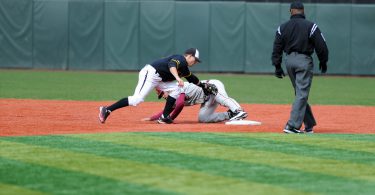Making the starting rotation in college is big accomplishment. In college baseball, there are typically three top starters who will pitch during each 3-game weekend series (some conferences do this differently with two or four-game series on weekends, but three is the most common). Most pitchers strive to be the “Friday starter”. He’s the ace and trusted to save the bullpen for later in the weekend and get his team the lead in each series.
In college, the goal of any weekend is to win the series. That means taking two out of three games. Most coaches set this as the goal every weekend because it is so attainable. The Friday night starter plays a huge part in whether or not his team achieves this goal, because winning the first game of a 3-game series puts the other team’s back against the wall. Every team wants to be in the position where they only have to win one of their next two games to win a series. So, the Friday starter is the stud. He’s counted on to go out there every Friday, pitch deep into the game, and give his team a chance to win.
Now, that’s not to say that the other starters aren’t good. Many Saturday, Sunday, and even fourth starters have just as good of stuff, if not better, than the Friday guy. But they aren’t likely to be quite as well-rounded, consistent, or polished as the Friday starter.
Whatever day you’re throwing, being in the starting rotation is a huge honor and requires a lot of hard work. There are all kinds of pitchers who can be effective at the collegiate level, but all of the top tier starters will likely have three things in common: pitchability and/or electric stuff, a strong mental game, and the ability to field the position. The worse a starter is at one of these aspects, the better they’ll have to be at the others so they don’t get exploited.
Pitchability and/or Electric Stuff
First and foremost, starting pitchers have to be able to compete in the strike zone. You cannot be an effective starting pitcher at the college level if you can’t throw strikes. Even if you’re able to put together a good outing without controlling the strike zone, opposing teams will wait you out, run up your pitch count, and chase you from the game in the middle innings. That’s not what your team needs. Starting pitchers have to be able to throw strikes on command with enough ‘stuff’ (velocity, movement, location) to get hitters out. Moreover, they have to be able to throw strikes in any count with at least two, but ideally three pitches. Two pitches can be good enough if you have an above average secondary pitch you can throw to hitters from both sides of the plate, but typically starting pitchers at the college level will have three ‘usable’ pitches they throw regularly. In order to consider a pitch usable, ask yourself if you would have 100% confidence throwing it with the bases loaded and a 3-2 count.
The most elite starting pitchers not only throw two or three pitches for strikes, they can also command the pitches in and out of the strike zone. While control is a pitcher’s ability to throw strikes, being able to throw to a specific part of the strike zone or a competitive pitch outside the strike zone (command) is what all pitchers should strive for with all of their pitches.
To say that all college starters have elite control and command is false. While the best starters have these skills, there is a small percentage of starters who rely more heavily on electric ‘stuff’. The nastier a pitcher’s ‘stuff’ is (harder they throw, more filthy the movement profile), the more margin for error they will gain with their control and command. That means that a guy who throws 95 is more likely to get away with fastballs that miss middle (or out of the zone) than a guy who throws 84 or a pitcher with a sharp breaking pitch will not have to be as good at throwing it in the zone or commanding it as well outside the zone, because hitters will chase it more often. Your goal if you want to be a college starter should be to have elite pitchability and electric stuff. That’s a deadly combo.
Strong Mental Game
Starting pitchers have to be able to control the pace of the game. In other words, they need to have a strong mental game. Starting pitchers can’t let an inning get out of control and start mixing walks with meatballs, leading to a quick 5 spot. A starting pitcher has to be able to step off, take a deep breath, buckle down, and get a big out. He has to be a fighter. He has to know when to speed up the tempo of the game, and when to slow it down. Every at-bat needs to be a war with the hitter. There are no mental breaks and there’s certainly no time to waste energy or effort on things outside of your control. Starting pitchers must control the controllable, and control their reactions and the way they deal with the uncontrollable.
Field The Position
In college, fielding your position means a lot more than just defense, although that is certainly part of it. A big part of your defensive role as a pitcher is to be a leader in controlling the running game. This means that you need to know all the pick-off plays like the back of your hand, be able to execute said pickoffs, vary your looks and timing in the set position, and deliver the ball to the plate from the stretch in less than 1.3 seconds (from first movement in your delivery to when the ball makes contact with the catcher’s glove). Additionally, you need to be comfortable running and executing the bunt plays, making a variety of throws to all infield bases, fielding bunts and comebackers, covering first, and being a solid fifth infield defender.
If you want to be in the weekend rotation at the college level, there is a lot you must be able to do on a consistent basis. Start by working on your pitches and your mentality. Develop an off-speed pitch you trust completely. Find a way to slow the game down and keep yourself under control no matter what the situation. Put more time into controlling the run game and fielding your position. Doing all this will greatly improve your ability to be more than just a thrower, but a complete pitcher and potential college starter.







